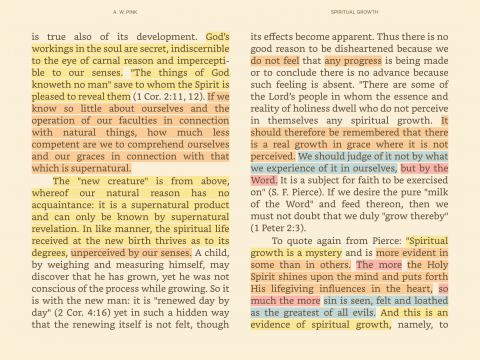
For precept must be upon precept, precept upon precept; line upon line, line upon line; here a little and there a little.
Isa. 28:10
Our spiritual growth is produced and promoted by the gracious, wise, patient, and faithful operations of the Holy Spirit. No real Christian is ever satisfied with his growth: far from it, for he is painfully conscious of what little progress he has made and how far short of God’s standard he comes.
It takes a firmer hold of the soil. More particularly is that the case in hot countries, for there the tap root of a tree has to penetrate deeper and deeper into the earth in order to find its needed moisture. An allusion to this aspect of our analogy is found in Hosea 14:6 where the Lord promises Israel that he shall “cast forth [or, better, ‘strike’—see margin] his roots as Lebanon,” that is, as the cedars of Lebanon struck their roots deeper into the mountain slopes—cf. “his smell as Lebanon” in the next verse where the obvious reference is to the fragrant aroma of the cedars. The spiritual counterpart of this is found in such expressions as “being rooted and grounded in love” (Eph. 3:17) and “continue in the faith, grounded and settled” (Col. 1:23), the two things being brought together in “rooted and built up in him and established in the faith” (Col. 2:7), which all speak in the language of our present similitude.
As the believer grows spiritually he takes a firmer grip on Christ and “lays hold on eternal life” (1 Tim. 6:12), no longer touching merely “the hem of his garment.” He becomes more settled in his knowledge and enjoyment of the Saviour’s love and is established more securely in the faith so that he is less liable to be “tossed to and fro and carried about with every wind of doctrine by the slight of men and cunning craftiness whereby they lie in wait to deceive” (Eph. 4:21). The young sapling has but a shallow and feeble grip on the earth and is therefore in greater danger of being uprooted by storms and gales; but the older tree, which has survived the hostile winds, has taken deeper root and is more secure, So it is spiritually; the young Christian is more susceptible to erroneous teachings, but those who are mature and established in the truth discern and refuse human fables. The more we are rooted in the love of Christ, governed by the fear of God, and have His Word dwelling richly in us, the less shall we be swayed by the fear of man, the customs of the world, or the assaults of Satan.
But more specifically: the downward growth of a Christian consists in increasing humility or becoming more and more out of love with himself. And this of necessity for in exact ratio to his real growth Godward will be his growth downward. The more we grow upward, that is, the more we take into our renewed minds spiritual apprehensions of the perfections of God, the excellency of the Mediator and the merits of His work, the more are we made conscious of what is due the One and the Other, and the more deeply do we feel what a poor return we have made unto them. If it be something deeper and more influential than a merely speculative or theoretical knowledge of the Father and the Son, if instead we be granted an experimental, vital, and affecting knowledge of them, then shall we he made thoroughly ashamed of ourselves, wholly dissatisfied with our love, our devotion, our conformity to their image. Such knowledge will humble us into the dust, making us painfully sensible of the coldness of our hearts, the feebleness of our graces, the leanness of our souls, and the corruptions which still indwell us.
The more a tree grows downward, the deeper its roots become imbedded in the earth, the more firmly it is fixed and the stronger it becomes, having a greater power to resist the force of the tempest. It is neither the height nor the girth of the tree, but the depths of its roots and its clinging to the ground which gives it stability and security. So it is spiritually. For the believer to grow downward is for him to have less and less confidence in and dependence upon himself: “when I am weak, then am I strong”; for a consciousness of my weakness causes me to turn more and more unto God and cling to Him. “O our God, wilt thou not judge them, for we have no might against this great company that cometh against us; neither know we what to do: but our eyes are upon thee” (2 Chron. 20:12)—that was the language of one who had grown downward.
We have stated that increasing humility in a Christian corresponds to the downward growth of a tree. As the upward growth of a tree is accompanied by its becoming more deeply rooted in the ground, so the Christian’s acquaintance with, love for, and delight in God, issues in a deeper self-depreciation and self-detestation. If the knowledge we have acquired of the Truth or if what we term our “Christian experience” has made us think more highly of ourselves and better pleased with our attainments and performances, then that is a sure proof we are completely deceived in imagining we have made any real growth upward. The grand design of the Scriptures is to exalt God and humble man, and the more we experimentally or spiritually know God the less we shall think of ourselves and the lower place shall we take before him. The knowledge which “puff eth up” is merely an intellectual or speculative one, but that which the Spirit imparts causes its recipient feelingly to own “I know nothing yet as I ought to know” (1 Cor. 8:2).
True humility dwells only in a heart which has been supernaturally enlightened of God and which has experimentally learned of Christ, and the more the soul learns of Christ the more lowly will it become. Even in natural things it is the novice and not the savant who is the most conceited. A smattering of the arts and sciences fills its youthful possessor with an exalted estimate of his wisdom, but the further he prosecutes his studies the more conscious will he become of his ignorance. Much more so is this the case with spiritual things. An unregenerate person who becomes familiar with the letter of the Truth imagines he has made great progress in religion; but a regenerate person even after fifty years in the school of Christ deems himself a very babe in spirituality. The more a soul grows in grace, the more does he grow out of love with himself. In one of his early epistles Paul said, “I am the least of the apostles” (1 Cor. 15:9); in a later, “who am less than the least of all saints” (Eph. 3:8); in one of his last, “sinners, of whom I am chief!” (1 Tim. 1:15)
A.W. Pink. Spiritual Growth.



